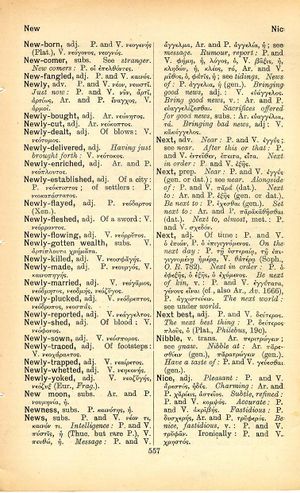next: Difference between revisions
ὣς ὁ μὲν ἔνθ' ἀπόλωλεν, ἐπεὶ πίεν ἁλμυρὸν ὕδωρ → so there he perished, when he had drunk the salt water
(Woodhouse 4) |
(CSV4) |
||
| Line 1: | Line 1: | ||
{{ | {{Woodhouse1 | ||
| | |Text=[[File:woodhouse_557.jpg|thumb|link={{filepath:woodhouse_557.jpg}}]]'''adv.''' | ||
<b class="b2">Near</b>: P. and V. [[ἐγγύς]]; see [[near]]. | |||
<b class="b2">After this</b> or <b class="b2">that</b>: P. and V. [[ἐντεῦθεν]], [[ἔπειτα]], [[εἶτα]]. | |||
<b class="b2">Next in order</b>: P. and V. [[ἑξῆς]]. | |||
'''prep.''' | |||
<b class="b2">Near</b>: P. and V. [[ἐγγύς]] (gen. or dat.); see [[near]]. | |||
<b class="b2">Alongside of</b>: P. and V. [[παρά]] (dat.). | |||
<b class="b2">Next to</b>: Ar. and P. [[ἑξῆς]] (gen. or dat.). | |||
<b class="b2">Be next to</b>: P. ἔχεσθαι (gen.). | |||
<b class="b2">Set next to</b>: Ar. and P. παρακαθῆσθαι (dat.). | |||
<b class="b2">Next to, almost</b>, met.: P. and V. [[σχεδόν]]. | |||
'''adj.''' | |||
Of time: P. and V. ὁ ἐπιών, <b class="b2">P</b>, ὁ ἐπιγιγνόμενος. | |||
<b class="b2">On the next day</b>: P. τῇ ὑστεραίᾳ, τῇ ἐπιγιγνομένῃ ἡμέρᾳ, V. θἀτέρᾳ (Soph., ''O.R.'' 782). | |||
<b class="b2">Next in order</b>: P. ὁ. [[ἐφεξῆς]], ὁ [[ἑξῆς]], ὁ ἐχόμενος. | |||
<b class="b2">Be next of kin</b>, v.: P. and V. ἐγγύτατα, γένους εἶναι (cf., also Ar., <b class="b2">Av.</b> 1666), P. ἀγχιστεύειν. | |||
<b class="b2">The next world</b>: see under [[world]]. | |||
}} | }} | ||
Revision as of 09:47, 21 July 2017
English > Greek (Woodhouse)
adv.
Near: P. and V. ἐγγύς; see near. After this or that: P. and V. ἐντεῦθεν, ἔπειτα, εἶτα. Next in order: P. and V. ἑξῆς. prep. Near: P. and V. ἐγγύς (gen. or dat.); see near. Alongside of: P. and V. παρά (dat.). Next to: Ar. and P. ἑξῆς (gen. or dat.). Be next to: P. ἔχεσθαι (gen.). Set next to: Ar. and P. παρακαθῆσθαι (dat.). Next to, almost, met.: P. and V. σχεδόν. adj. Of time: P. and V. ὁ ἐπιών, P, ὁ ἐπιγιγνόμενος. On the next day: P. τῇ ὑστεραίᾳ, τῇ ἐπιγιγνομένῃ ἡμέρᾳ, V. θἀτέρᾳ (Soph., O.R. 782). Next in order: P. ὁ. ἐφεξῆς, ὁ ἑξῆς, ὁ ἐχόμενος. Be next of kin, v.: P. and V. ἐγγύτατα, γένους εἶναι (cf., also Ar., Av. 1666), P. ἀγχιστεύειν. The next world: see under world.

